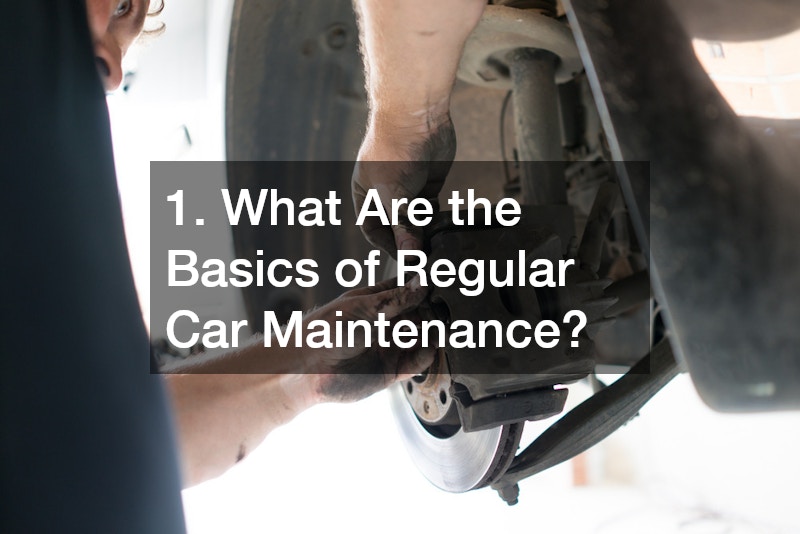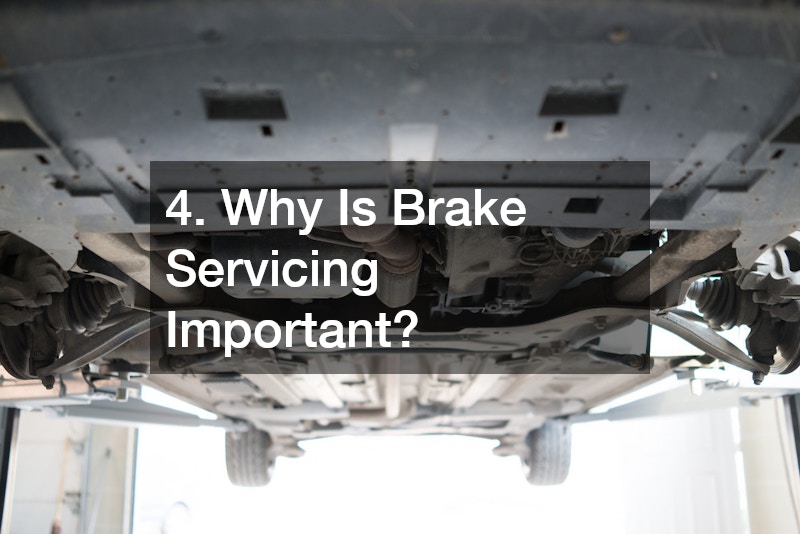Car Ownership 101 Basic Servicing You Need to Keep Up With
Owning a car is a significant responsibility and goes beyond merely driving it. Taking proper care of it through basic servicing ensures that it runs smoothly and maintains its reliability over the years. Regular maintenance not only extends the life of your vehicle but also protects you from unexpected breakdowns and costly repairs. This article is crafted to guide car owners through fundamental servicing tasks that are essential for any vehicle. By familiarizing yourself with these tasks, you can embark on a journey towards smarter car ownership, where safety and longevity are paramount. Understanding the nuances of car maintenance helps in transforming responsibilities into a routine that’s easy to manage.
1. What Are the Basics of Regular Car Maintenance?

Basic servicing begins with a strong foundation of regular maintenance, which includes checking and replacing fluids, inspecting key vehicle systems, and ensuring everything is functioning properly. Regular oil changes are a cornerstone of car maintenance, helping to keep the engine clean and lubricated. It’s also vital to regularly inspect brakes, tires, lights, and other components.
Local auto body repair shops can assist with dent repair and cosmetic maintenance, keeping your car looking its best while avoiding further damage. When engaging local auto body repair services, developing a relationship with trustworthy professionals can help you manage wear and tear. Consistency in upkeep directly reflects on the vehicle’s aesthetics and performance.
Beyond the physical aspects, understanding your vehicle’s manual and engaging with your auto mechanics about potential issues is crucial. Consider befriending a local car repair shop, where the staff are familiar with keeping your vehicle in top condition. Basic servicing shouldn’t be intimidating; instead, it’s a structured approach to safeguarding your automotive investment.
2. How Often Should You Change Your Oil?
Changing your oil is a fundamental aspect of basic servicing, essential for maintaining engine health and efficiency. Oil acts as a lubricant and coolant, reducing friction and carrying away heat from engine components. The frequency of oil changes can depend on your vehicle’s make and model, the type of oil used, and your driving patterns.
For those who drive European cars, seeking European auto repair services might be beneficial. These specialists are knowledgeable about specific needs and nuances of European car models. European auto repair shops can also offer advice on the right type of oil and the ideal intervals between changes, ensuring you’re well-informed.
Regular oil changes improve your car’s performance and fuel efficiency, reducing the chances of long-term engine damage. Consult your car’s manual or a reputable car repair shop to determine the recommended oil change interval. Staying consistent with this part of basic servicing aids in maintaining your car’s health while enhancing its performance on the road.
3. When Should You Rotate Your Tires?
Tire rotation is an integral step in basic servicing and significantly contributes to the even wear of your tires. By periodically rotating your tires, you ensure a balanced tread wear pattern, which prolongs tire life and maintains your vehicle’s handling capabilities. Typically, it’s advisable to rotate your tires every 5,000 to 8,000 miles.
An auto insurance provider may even recommend tire rotation as part of maintaining your vehicle’s safety standards. Regular servicing, such as this, not only enhances your safety on the road but can also lead to more favorable insurance premiums. Basic servicing steps like tire rotation make a notable difference in vehicle longevity.
Understanding tire wear patterns and balancing these through proper rotation helps avoid uneven pressure on certain tires, reducing the risk of sudden blowouts. Rely on a qualified car repair shop to perform tire rotations as part of your vehicle’s routine care. Tire rotation remains a cost-effective way to enhance driving safety and vehicle lifespan as part of your regular service regimen.
4. Why Is Brake Servicing Important?

Brake servicing is a critical element of basic servicing and is essential for safe driving. Regular inspection of your brake pads and rotors ensures they’re in good working condition and can prevent severe issues down the line. Failing brakes aren’t only dangerous, but they can lead to expensive repairs and increased insurance costs.
Auto mechanics are vital in diagnosing any potential brake problems before they become hazardous. Regular checkups should include brake repairs, emphasizing the role of a professional transmission mechanic who can examine the entire system. Timely brake servicing revolves around the certainty of safety and the preservation of vehicle integrity.
DIY diagnostics like checking brake fluid levels and listening for unusual noises can be part of your regular maintenance routine. Whenever abnormalities arise, consulting with your auto mechanics promptly assures safety on the road. Brake servicing isn’t just about prevention; it symbolizes proactive measures in maintaining the tranquility of your vehicular journey.
5. What Is the Role of Coolant in Your Car?
Coolant plays an instrumental role in engine temperature regulation, protecting the engine from overheating and corrosion. It’s a vital component of your car’s basic servicing routine. Checking and maintaining proper coolant levels ensures that your engine remains within the optimal temperature range and operates smoothly.
Many car owners might overlook coolant checks, which can lead to significant engine problems. It’s advisable to check coolant levels with regular maintenance and top-up or replace when necessary. Seeking guidance from an experienced car repair shop can aid in keeping your vehicle’s cooling system working effectively.
Given the complex nature of modern engines, regular coolant checks by professionals can prevent overheating and contribute to overall engine health. Local auto body repair shops often provide comprehensive inspections to keep your car in its best condition. As part of basic servicing, maintaining adequate coolant levels betokens a commitment to longevity and performance.
6. How to Keep Your Battery in Good Condition?
A well-maintained battery is critical to your car’s operation, and part of regular basic servicing. Ensuring your battery is functioning properly helps avoid inconvenient breakdowns and is key to reliable performance. Regular inspections and cleanings prevent buildup on terminals and ensure your electrical systems function without a hitch.
Headlight restoration may be necessary if fogging around the lights occurs, an issue sometimes linked with battery performance. A qualified mechanic can provide insight into both battery health and issues relating to headlight restoration. Conversations with your local car repair shop specialists about battery care can lead to improved overall maintenance strategies.
Checking battery voltage periodically provides a clearer picture of its health and longevity. Professional advice, perhaps from a European auto repair shop, could guide you on when it’s time to replace your battery altogether. Proper battery maintenance, as part of basic servicing, underlines the core tenet of ensuring reliability and readiness at all times.
7. What Are the Signs of Transmission Problems?

Transmission issues can be detrimental to your vehicle’s performance and longevity, making them a critical focus in any basic servicing regimen. Warning signs such as slipping gears, delayed shifting, or unusual noises indicate potential transmission problems that need immediate attention. Proactive monitoring and prompt repairs prevent costly damage.
Brake repairs, alongside transmission servicing, could provide insights into interconnected vehicle performance issues. Consulting a transmission mechanic is often the best course of action to thoroughly address these concerns, ensuring safety and preventing the escalation of minor problems. Transmission health is pivotal for smooth and efficient driving.
Pursuing regular check-ups at a trusted car repair shop aids in early detection of transmission faults. Being proactive about addressing signs of transmission wear prevents downtime and costly interruption to your mobility. Emphasizing transmission care within basic servicing models your dedication to comprehensive vehicle care practices.
8. How Important Is Air Filter Replacement?
Air filter replacement is an often-overlooked but vital part of basic servicing, directly influencing engine efficiency and performance. Clean air filters ensure that dirt, dust, and other harmful debris do not enter the engine, maintaining optimal airflow and combustion efficiency. Without proper airflow, the engine must work harder, which can lead to reduced power, sluggish acceleration, and unnecessary strain on vital components. Replacing them regularly safeguards your engine while also enhancing fuel economy by allowing the combustion process to run more smoothly.
Visiting your local car repair shop for inspections helps you understand when an air filter has reached the end of its cycle. Professionals can identify whether your filter needs replacement or if a simple cleaning will suffice, saving you money while maintaining performance. Basic services like these are crucial for preventing long-term damage and ensuring a smoother, more reliable driving experience.
Over time, filters inevitably become clogged, particularly if you frequently drive in dusty or high-traffic environments. A clogged filter restricts airflow and can increase fuel consumption while reducing horsepower. Consistent replacement fosters a cleaner, more harmonious engine environment and prolongs its lifespan. By prioritizing air filter replacement within your maintenance routine, you reinforce your commitment to keeping your vehicle efficient, dependable, and road-ready.
9. What to Know About Fuel System Maintenance?
Maintaining the fuel system is essential for overall vehicle health and performance. Basic servicing routines should always include a check of the fuel injectors, pumps, and filter for contaminants or malfunctions that can impede engine efficiency. Regular maintenance of the fuel system reduces emissions and improves economy, allowing your car to perform at its best while also saving money at the pump.
Fuel injectors, for example, can become clogged with carbon deposits over time, causing rough idling or hesitation when accelerating. A simple cleaning or timely replacement can restore optimal spray patterns and improve combustion. Similarly, replacing a clogged fuel filter ensures that dirt and debris don’t restrict fuel flow or damage delicate engine components. Even the fuel pump, often overlooked, should be inspected regularly to avoid sudden failures that can leave you stranded.
Whether consulting a familiar car repair shop or a specialist transmission mechanic, expert insight into maintaining your fuel system is invaluable. This aspect of basic servicing plays a crucial role in ensuring your vehicle runs smoothly.
For diesel vehicles, incorporating diesel repair services is especially important. Diesel systems operate under higher pressures and require precision maintenance. Knowledgeable professionals can provide tailored solutions, reinforcing the role of consistent fuel system attention as a cornerstone of vehicle reliability.
10. Why Regular Alignment and Balancing Is Crucial?

Ensuring your car’s wheels are properly aligned and balanced is a critical component of basic servicing, affecting ride comfort and vehicle handling. Misalignment can cause tires to wear unevenly, leading to a shorter lifespan and increased fuel consumption. Regular checks prevent these issues and enhance your driving experience.
Scheduling routine maintenance at a trusted car repair shop can avert long-term issues and promote safer driving conditions. Regular alignment and balancing can also identify and rectify any underlying problems causing irregular tire wear patterns. Ensuring proper alignment maintains vehicle efficiency and driver safety.
For cars with more complex suspension setups, such as certain diesel vehicles, scheduled diesel repair at a specialized shop can be beneficial. Professionals ensure precision alignment, which is vital for high-performance and heavily-loaded vehicles. This fundamental check remains a cornerstone of proactive vehicle care.
Keeping up with basic servicing tasks is essential for maintaining the health and performance of your car. These tasks not only extend the life of your vehicle but also ensure safety and improve its resale value. By adhering to the various aspects of basic servicing outlined in this article, you can enjoy a more reliable, efficient, and cost-effective driving experience.
From regular oil changes and tire rotations to timely brake repairs and coolant checks, each step forms an integral part of your vehicle’s well-being. Partnering with knowledgeable professionals, whether you’re dealing with dent repair or seeking advice from a transmission mechanic, can guide you through complex issues seamlessly. Embrace these practices and fortify your journey on the road to informed and responsible car ownership.
Remember, cars are an investment, and keeping them in prime condition requires consistent attention through basic servicing. Ensure you’re not only driving safely but also maximizing the value and enjoyment of your vehicle by prioritizing regular maintenance. Engage actively with your vehicle’s needs to experience a more fulfilling and secure automotive relationship.


